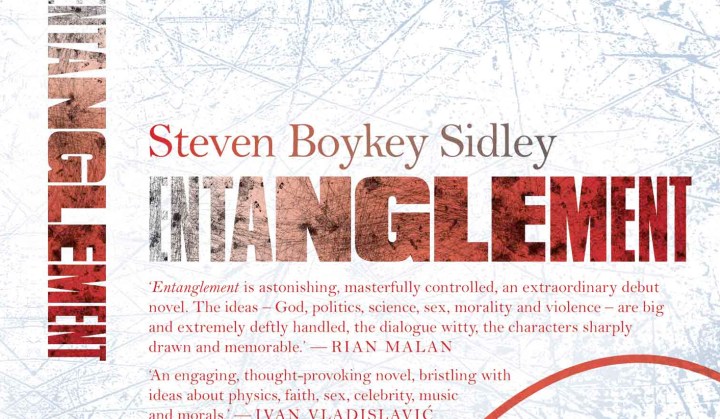Maverick Life
Einstein on the beach: A perfectly crafted fancy

Steven Boykey Sidley has leapt into the literary limelight with a book called Entanglement. It’s a glorious mash-up of Phillip Roth, Saul Bellow, Ian McEwan and Elmore Leonard. Horny, heady and thrilling, Entanglement is a beach read for people who would rather be shot than go to the beach.
“One thought-murder a day keeps the psychiatrist away,” spat the enraged protagonist of Saul Bellow’s stunning roman a clef, Herzog.
Moses E Herzog, academic and writer, is more relevantly the cuckolded ex-husband of the mercurial Madeleine. And he’s coming to pieces. His shoulder is set firmly against the world: he is raging and scratching and hair-pulling and throwing haymakers. But mostly, he is writing letters. Some of his missives are written to the living, others are meant for the dead. Like this one, for instance:
“No, really, Herr Nietzche, I have great admiration for you. Sympathy. You want to make us able to live with the void. Not lie ourselves into good-naturedness, trust, ordinary middling human considerations, but to question as has never been questioned before, relentlessly, with iron determination, into evil, through evil, past evil, accepting no abject comfort. The most absolute, the most piercing questions. Rejecting mankind as it is, that ordinary, practical, thieving, stinking, unilluminated, sodden rabble, not only the laboring rabble, but even worse the ‘educated’ rabble with its books and concerts and lectures, its liberalism and its romantic theatrical ‘loves’ and ‘passions’—it all deserves to die, it will die.”
We meet the hero of Steven Boykey Sidley’s debut novel Entanglement—a physicist named Jared Borowitz—about a year or so before he descends into what will certainly become a full-blown Herzogian meltdown. He’s similarly ranting and raving. His girlfriend, a psychiatrist named Katherine, has yet to have an affair with one of his colleagues, although one understands why she might be tempted to do so.
Borowitz, despite his manifest talents and blessings, is a curmudgeon. Visiting his mentor, a legendary physicist who happens to be on his deathbed, Borowitz unleashes the following salvo, regardless of the fact that the old man has one toe firmly dipped in the River Styx:
“It’s one thing staring dumbstruck with horror at an astrologist on TV, it is quite another when your friends—educated, smart and witty people—are prepared to suck up any old shit. I don’t know—quack alternative remedies, religious rituals, soothsayers, self-help books, motivational speakers, healing oils and unguents, unedited Internet conspiracy theories and fakery of all kinds. And worse, when an objection is lodged, they have the temerity to accuse me of having a closed mind, or worse, offer quack scientific explanations.”
These are the literary rapids that Sidley negotiates so skillfully in his first, and surely not his last, novel. Sex—talking about it, remembering it, performing it, pursuing it—hints at old Benny Hill clips, and their literary counterpart: Phillip Roth’s comic novels. Borowitz’s best pal, the randy writer Ryan Venosa, could be an older Portnoy, or a younger Mickey Sabbath—an overweight, priapic ego, ever on the lookout for an id.
In the second act, we meet an oversexed nymph named Barbara, who is the catalyst for a night of darkest violence. While not quite bookshop porn á la 50 Shades of Gray, Entanglement is indeed a horny book.
It’s also a heady one. Sidley does a fine job of handling the theoretical physics that form the sharp point of Borowitz’s intellectual spear—the theorems that keep idiocy at bay, the salve of science that keeps God and other metaphysical inconveniences from his mental doorstep.
In this, we are reminded of Henry Perowne, the neurosurgeon in Ian McEwan’s Saturday. Structurally, Entanglement borrows something of Saturday’s violence-vs-reason home-invasion plot (without descending into the complete stupidity that marred McEwan’s effort), mashing it up with Bellow and Roth’s Angry Professor genre, and then mixing in something nasty from the desk drawer of Elmore Leonard or, better, Miami-based neon-noir satirist Carl Hiaasen.
Sidley isn’t shy about parading his literary influences. As much as I believe a reviewer should avoid biographical details, for fear of sounding like a wannabe shrink, I think the following is pertinent: Sidley has written his first novel in his 50s, and it is ballasted by a lifetime of voracious reading. Every character in the book is a reader.
“His love affair with novels has lasted a long time,” writes Sidley of Borowitz, “ever since Catch-22, Portnoy’s Complaint and The French Lieutenant’s Woman, read at 17, late into the night, struck him mute for days at a time as he fell headlong into worlds previously unimagined.” Even Entanglement’s villain, the backwoods, yanked-from-Deliverance hick named Chet, has a couple of university degrees under his gun belt, and talks like a university don who chose rape and crack as off-campus hobbies.
Yes, this is a book nerd’s book. But it is more than the sum of its influences; it is a genuinely fun read, consumable in an afternoon, if not a parsing of “worlds previously unimagined”, a fine reboot of world’s visited relatively often.
The story is bookended by two successive commencement speeches, part of Borowitz’s duties as faculty deity at his university. (Entanglement is set somewhere in the US, which is an uncharacteristically mealy aspect of the narrative that rings a little false). While Borowitz spits like a viper at the world around, he hastily arranges a visit to his mentor, who is dying in a London hospital.
The last days of the great physics professor deeply shakes Borowitz, and when he encounters a posse of hooligans on the London Underground after the visit, he delivers a well-aimed punch at the acne-pocked schnoz of the largest of them. This act of violence invigorates him, it unlocks the raw masculinity buried beneath striations of scientific reason and deeply imbedded liberal humanist sensibilities. (A result of reading all those novels, one imagines.)
Shortly after Borowitz returns home, he and Katherine engineer a wilderness weekend with the dissolute novelist and his coloured South African girlfriend, Tam-Tam (the book’s weakest character, and something of a vector for Sidley’s musings on the current state of our nation).
Also along for the journey: Katherine’s 20-year-old cousin, Clive, and the aforementioned nymph, Barbara. Here, Sidley hits a perfect groove: “Jealousy and desire will stick to her, succubus-like, through no fault of her own…[p]eople like this should be locked in attics like the deformed and disabled of earlier times, lest they unbalance the natural order of things…”
A chance meeting in a country bar—Barbara dancing seductively while toothless Pabst Blue drinkers stare on in awe—throws Chet into the mix. When he arrives at the vacation house in the middle of the night with an accomplice, it isn’t to sample the Merlot. Chet is pure sociopath, and Sidley suggests he represents the tumour growing inside Borowitz: turn away from the world, allow your foibles to define you and your peccadilloes to become mission statements, and you devolve into a subhuman. Catastrophic violence is but a misstep away.
The principal pleasures of this book—the movie-ready dialogue, the recognisable but spruced-up literary tropes, the sex and the violence—are perfectly metered out. The feminazis will bray at all the female gazing and objectification—Borowitz and Vernosa are nothing if not pussy-struck. But Sidley is that remarkable male novelist, at least as far as a Roth acolyte is concerned, for his sensitive, nuanced portrayal of Katherine, as fully a drawn female character as one can expect from a first-at-bat.
“Unless you’re completely exploded, there’s always something to be grateful for,” wrote Bellow in Herzog. Borowitz avoids complete explosion, and Entanglement isn’t anywhere near as dark as many of the great books that have inspired it. It’s a lark, a headlong run through the literary meadow, a perfectly crafted fancy drenched in influence and in a love of reading.
Steven Boykey Sidley has arrived on the scene. I look forward to his mash-up of The Adventures of Augie March, Madame Bovary and the Hardy Boys.















 Become an Insider
Become an Insider